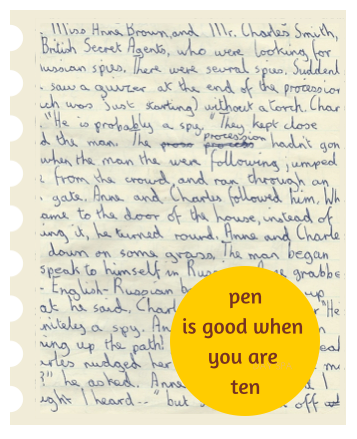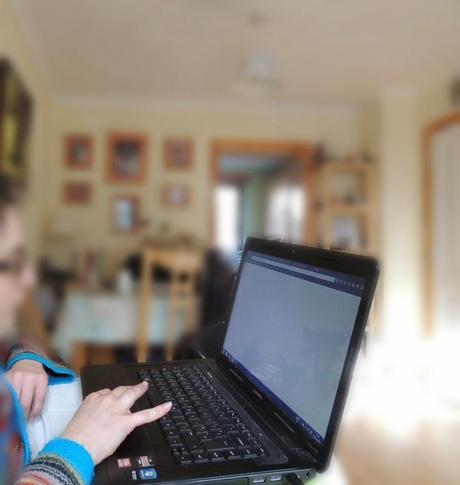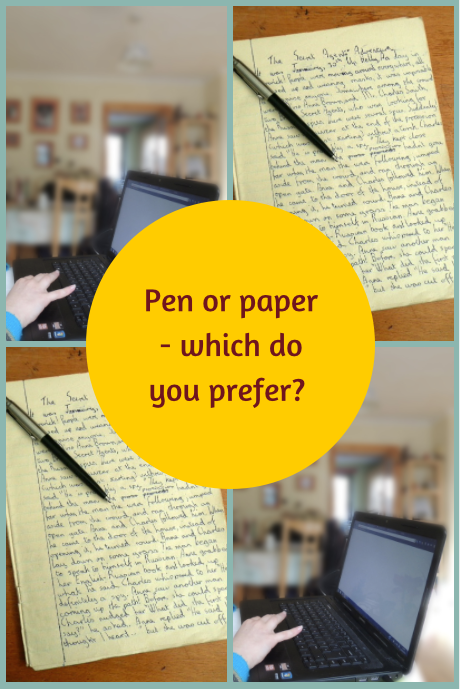Okay, if we want to be totally accurate, when I began writing I used a pencil and jotter. I can still remember the jotter I wrote in, and can remember forming rows of as across the page. Once a was mastered, I moved on to b.
 By the age of nine, I had progressed to a ball-point pen - occasionally I even used a green one, and wrote THE END in pink and yellow! Wow, that was cool! As well as tales about my cat being sick over the local newspaper, I was writing adventure stories about secret agents and Russian spies. Research wasn't my strong point, with lines like these:
By the age of nine, I had progressed to a ball-point pen - occasionally I even used a green one, and wrote THE END in pink and yellow! Wow, that was cool! As well as tales about my cat being sick over the local newspaper, I was writing adventure stories about secret agents and Russian spies. Research wasn't my strong point, with lines like these:The man began speaking to himself in Russian. Anne [one of the agents] grabbed her English-Russian book and looked up what he said. Charles whispered to her, "He's definitely a spy. Anne saw another man coming up the path.I hadn't learned about paragraphs then, or if I had, I'd forgotten. My grasp of quotation marks was generally okay, so the missing one was probably due to the excitement of writing an espionage thriller. My handwriting was better than it is now. Coincidentally, one of the characters in the novel I'm currently writing is called Charles.
I was still plodding away in jotters when I wrote my first novel at the age of thirteen. Research still wasn't my strong point, and I thought that:
a) I'd be the youngest ever published writer
b) everyone but our family had treasure hoarded away in the attic
c) villains had bushy eyebrows
I had learned how to use paragraphs then, and I even divided the novel into chapters. But, sadly I can't show you a screen-shot of that novel because I burned when I was sixteen, page my page. My cheeks were burning too, I was so appalled at what my thirteen-year-old self had thought was brilliant writing.
So, I went back to painting and didn't write much for several years. Or at least, not much other than: "Why doesn't he love me? What did I do wrong? What's she got that I haven't? I hate him." (And, no, I can't show you a screen-shot because I burned all those too!)
Eventually, those, "Where did I go wrongs?" began to form into poems. (I use the term very loosely here, because my ability at poetry remains at a similar level to that of my research skills at ten.) Somehow they evolved into stories. I began to write for enjoyment, not just because I had some misery to express.
I still wrote with a pen and pad. It was all I had. We bought a typewriter, a fancy one that could delete automatically. (You backspaced and a correction ribbon dolloped white onto the paper, so it worked fine as long as you used white paper.) I struggled away, deleting as often as I typed. I was looking for a temporary job around that time and one recruitment agency asked me to sit a typing test. I scored twelve words a minute. Yes, I could write way faster.
 Then we bought a computer. A computer that had no memory to speak of, and that needed floppy disks (which weren't floppy at all) to store my stories. Mistakes could be fixed without the help of a correction ribbon. Still, my working methods didn't change much. In spite of my s-l--o-w--n-e--s---s at typing, it was sometimes faster than the computer could make the word appear on the screen. (Yes, those of you too young to remember, some computers really were that slow.)
Then we bought a computer. A computer that had no memory to speak of, and that needed floppy disks (which weren't floppy at all) to store my stories. Mistakes could be fixed without the help of a correction ribbon. Still, my working methods didn't change much. In spite of my s-l--o-w--n-e--s---s at typing, it was sometimes faster than the computer could make the word appear on the screen. (Yes, those of you too young to remember, some computers really were that slow.) Besides, my brain just seemed more suited to good old paper and pen. Ideas flowed better - probably because I wasn't constantly thinking, "Oh sh**, I've just spelled sh** wrong. Yet again. Now where was I?" So I plodded on, drafting by hand, typing up later.
We bought our first Mac, with more memory and and enormous hard drive. I was in love. (I did get married sometime around then, but I'm talking about the Mac.) Time lags between keyboard and screen still happened, but less often. Soon I could write short pieces on the keyboard, pieces like this post. The more I needed to use my imagination though, the more I'd sit blankly looking at the screen. I still needed to start fiction on paper, and once it flowed I'd carry on at the computer. At least for that day, or that chapter or that scene. I managed to write a 160,000-word first draft of a novel that way.
Then a few years ago my daughter (aged thirteen at the time) decided I should join in her taking part in NaNoWriMo.
"No way," I said. "I don't write fast. I could never do 50,000 words in a month. And if I did, they would be rubbish."
But that's the point. NaNo gets you past all those fancy high-falluting ideas of writing literature and gets you writing. I had a go. I adopted the same working method that worked for me on paper, and let whatever came into my head, also come onto the screen. And I mean whatever. For instance:
Anne grabbed her English-Russian book and looked up what he said. I really ought to do some more research since I doubt if, "Do you sell stamps?" or "Can you direct me to the shopping mall," are the phrases a secret agent would need to know.Okay, so I didn't really write that, but you get the idea - it all went down there, just to keep the writing process flowing. And there were a lot of typos. I may make fewer mistakes than I used to, and can probably now type as fast as I write, but I'm still not sure I want to sit a typing test any day soon.
 Still, that experience taught me I wasn't really a slow writer - on the last day, I wrote nine thousand and somethingty-something words. (All I can remember is it wasn't quite 10,000.) It also taught me I could have creative ideas while writing on a keyboard. So I kept doing that. But at that time I was mostly writing articles and when I tried to get back to the novel it wouldn't do what I wanted - or the characters wouldn't. In any case, it's temporarily abandoned. Meantime, last November, NaNoWriMo arrived and I started a new novel, at the keyboard.
Still, that experience taught me I wasn't really a slow writer - on the last day, I wrote nine thousand and somethingty-something words. (All I can remember is it wasn't quite 10,000.) It also taught me I could have creative ideas while writing on a keyboard. So I kept doing that. But at that time I was mostly writing articles and when I tried to get back to the novel it wouldn't do what I wanted - or the characters wouldn't. In any case, it's temporarily abandoned. Meantime, last November, NaNoWriMo arrived and I started a new novel, at the keyboard. My plan was for a romantic comedy, but it wasn't very funny, so I started again. And again. I'm not sure if the new beginning will remain, but unlike the earlier versions it doesn't mess up the rest of the plot. My plan was to write this entire novel with keyboard and screen, but that plan must have been made in a different part of my brain to the one that comes up with ideas. Time after time, that part has sent me back to paper and pen, to to work out where to go next or to understand exactly what a character would do in a particular scene.
Writing with a pen and paper just feels less formal - less final. I know am going to change tons of it, and so the ideas tumble out in ways they don't when I stare at a computer screen. Perhaps if my thoughts came in a linear way I'd find typing a complete first draft easy enough, but that's not how my mind works. I get an idea, write a scene and then, as I wrote in What is a First Draft, ideas for how to develop that scene or the characters keep popping into my mind - afterwards. So the characters evolve and story evolves. Somehow, for me that seems to require at least some of the writing to take place with a pen and paper. It might take longer, or it might not. But at least, unlike that novel I began a few years ago, I feel confident that I'll get this one to the finish line.
I love hearing from you, so let me know: which do you prefer - pen or keyboard?
Follow my blog with Bloglovin

